|
|
|
Sort Order |
|
|
|
Items / Page
|
|
|
|
|
|
|
| Srl | Item |
| 1 |
ID:
130405
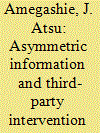

|
|
|
|
|
| Publication |
2014.
|
| Summary/Abstract |
I study a two-period model of conflict with two combatants and a third party who is an ally of one of the combatants. The third party is fully informed about the type of her ally but not about the type of her ally's enemy. In a signaling game, I find that if the third party is unable to give a sufficiently high assistance to her ally, then there exists a unique separating equilibrium in which the third party's expected intervention causes her ally's enemy to exert more effort than in the absence of third-party intervention; this worsens the conflict.
|
|
|
|
|
|
|
|
|
|
|
|
|
|
|
|
| 2 |
ID:
074557
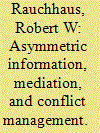

|
|
|
|
|
| Publication |
2006.
|
| Summary/Abstract |
This article examines mediation in conflicts using both a game-theoretic model and a quantitative analysis. The game-theoretic model suggests that mediator effectiveness rests primarily on the ability of third parties to provide critical information about the disputants' reservation points. The empirical analysis finds that mediation that targets asymmetric information is a highly effective form of conflict management. Moreover, the results suggest that mediation outperforms other forms of third-party intervention, including those that entail coercion. Both the model and quantitative analysis indicate that impartial mediators will generally outperform biased ones. Along with providing new information on conflict management, the quantitative analysis also has broader implications for IR theory. The results provide empirical support for the rationalist claim that asymmetric information is one of the root causes of war.
|
|
|
|
|
|
|
|
|
|
|
|
|
|
|
|
| 3 |
ID:
092526
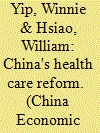

|
|
|
|
|
| Publication |
2009.
|
| Summary/Abstract |
China has recently unveiled an ambitious new health-care reform plan, entailing a doubling of government health spending as well as a number of concrete reforms. While the details of the plan have not yet been completely announced, we offer a preliminary assessment of how well the reform is likely to achieve its stated goal of assuring every citizen equal access to affordable basic health care. The reform is based on three fundamental tenets: strong role of government in health, commitment to equity, and willingness to experiment with regulated market approaches. Within this framework, the reform offers a number of laudable changes to the health system, including an increase in public health financing, an expansion of primary health facilities and an increase in subsidies to achieve universal insurance coverage. However, it fails to address the root causes of the wastes and inefficiencies plaguing China's health care system, such as a fragmented delivery system and provider incentives to over-provide expensive tests and services. We conclude that China should consider changing the provider payment method from fee-for-service to a prospective payment method such as DRG or capitation with pay-for-performance, and to develop purchasing agencies that represent the interests of the population so as to enhance competition.
|
|
|
|
|
|
|
|
|
|
|
|
|
|
|
|
| 4 |
ID:
149912
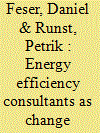

|
|
|
|
|
| Summary/Abstract |
Residential energy consumption has been increasingly singled out by public policies as a key area for potential emission reduction. The public implementation of energy efficiency consultants (EECs) as change agents aims at the diffusion of innovation in residential building efficiency and overcoming information asymmetries in the construction sector. However, the success of these measures has been described as low. We conducted a case study involving 17 in-depth expert interviews to examine the causes of this failure in the case of Germany. In Germany, EECs are organized in a certification scheme which is prerequisite to participate in the publicly funded subsidy system. This analysis has important implications for EECs in general and hence other European countries pursuing such policies. We show that information asymmetries (ex-ante/ex-post) in the ECC market lead to a low willingness to pay. Certification of EECs does not suffice to overcome information asymmetries. We also identify a mismatch between EECs and customer incentives. As top-down policies have failed to facilitate a viable EEC market, we recommend a greater role for private and private-public networks, the cutting of EEC subsidies and a closer alignment between climate policy goals and home owners’ economic efficiency considerations.
|
|
|
|
|
|
|
|
|
|
|
|
|
|
|
|
| 5 |
ID:
072643
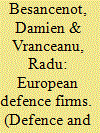

|
|
|
|
|
| Publication |
2006.
|
| Summary/Abstract |
After the fall of the Berlin Wall, European governments adopted a hands-off policy towards the defence industrial base, in an attempt to increase the sector's efficiency and reactivity. In this context, one topical issue is how to motivate defence firms to apply for private rather than public finance. Since banks have no prior experience with European defence firms, a problem of asymmetric information may block this transition. The problem is analysed within the framework of a game between defence firms and banks. It is shown that the Bayesian Equilibrium might correspond to a situation where low-risk firms prefer the state-financed scheme; yet, in a perfect information set-up, the same firms would apply for bank credit. In order to facilitate the transition to private finance, the government might decide to subsidize investors who agree on financing defence firms; the state aid should be made available during a transitory learning period.
|
|
|
|
|
|
|
|
|
|
|
|
|
|
|
|
| 6 |
ID:
194800


|
|
|
|
|
| Summary/Abstract |
In dyadic ultimatum bargaining proposers, who are privately informed about the pie size, can exploit their “moral wiggle room” by engaging in unfairness which is unobservable by responders. Our setup instead assumes better informed responders and, as a consequence, limits ultimatum power and questions conflict resolution via acceptance of ultimatum proposals. In addition to testing the game theoretic solution, based on common opportunism, we assess whether two different market framings boost benchmark behavior. Our results confirm nearly universal responder opportunism. Although the benchmark proposer demand is modal, proposer choices display substantial variation, even in later rounds and even in the range in which lower demands would let both parties expect to earn more. Nevertheless, such inefficiently large demands become less frequent across rounds. Our results also show that market framing is insignificant and more so in later rounds.
|
|
|
|
|
|
|
|
|
|
|
|
|
|
|
|
| 7 |
ID:
177189
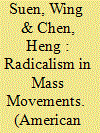

|
|
|
|
|
| Summary/Abstract |
Asymmetric information and diverse preferences for reform create an agency problem between opposition leaders and citizens. Dissatisfied citizens are unsure of how bad the current situation is but infer this information from the scale of the leader’s reform proposal. Because radical leaders have an incentive to exaggerate and mislead, to command credibility, they must paradoxically radicalize the proposal further as a way of signaling the necessity of change. Radicalism motivated by signaling is costly, as it reduces a movement’s chances of success. This mechanism also contributes to leadership radicalization when the leaders of movements arise as a compromise among diverse interests.
|
|
|
|
|
|
|
|
|
|
|
|
|
|
|
|
| 8 |
ID:
153777
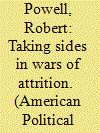

|
|
|
|
|
| Summary/Abstract |
Third parties often have a stake in the outcome of a conflict and can affect that outcome by taking sides. This article studies the factors that affect a third party's decision to take sides in a civil or interstate war by adding a third actor to a standard continuous-time war of attrition with two-sided asymmetric information. The third actor has preferences over which of the other two actors wins and for being on the winning side conditional on having taken sides. The third party also gets a flow payoff during the fighting which can be positive when fighting is profitable or negative when fighting is costly. The article makes four main contributions: First, it provides a formal framework for analyzing the effects of endogenous intervention on the duration and outcome of the conflict. Second, it identifies a “boomerang” effect that tends to make alignment decisions unpredictable and coalitions dynamically unstable. Third, it yields several clear comparative-static results. Finally, the formal analysis has implications for empirical efforts to estimate the effects of intervention, showing that there may be significant selection and identification issues.
|
|
|
|
|
|
|
|
|
|
|
|
|
|
|
|
| 9 |
ID:
101884
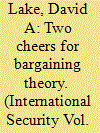

|
|
|
|
|
| Publication |
2011.
|
| Summary/Abstract |
The Iraq War has received little sustained analysis from scholars of international relations. I assess the rationalist approach to war-or, simply, bargaining theory-as one possible explanation of the conflict. Bargaining theory correctly directs attention to the inherently strategic nature of all wars. It also highlights problems of credible commitment and asymmetric information that lead conflicts of interest, ubiquitous in international relations, to turn violent. These strategic interactions were central to the outbreak of the Iraq War in 2003. Nonetheless, bargaining theory is inadequate as an explanation of the Iraq War. Although the problem of credible commitment was real, it could not be solved because of the prior beliefs of the Bush administration that Saddam Hussein was uniquely evil and because of Saddam's inability to signal accurately to multiple audiences, both factors now outside bargaining theory. Nor was the problem of private information an important impediment to bargaining; rather, the information failures observed in both Washington and Baghdad were of their own making as each formed self-deluding beliefs and expectations. Bargaining theory also ignores postwar governance costs and domestic interest groups, both of which contributed to the war. All of these problems require either considerable amendments to the theory or the revision of core assumptions. Drawing on this critique, the final sections draw out the analytic and policy lessons of the Iraq War and suggest, most importantly, the need for a new behavioral theory of war.
|
|
|
|
|
|
|
|
|
|
|
|
|
|
|
|
| 10 |
ID:
070103
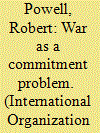

|
|
|
| 11 |
ID:
120130
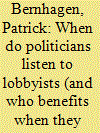

|
|
|
|
|
| Publication |
2013.
|
| Summary/Abstract |
This article provides an empirical test of an informational model of lobbying. The model predicts when lobbyists provide useful information to policy makers and when policy makers follow lobbyists' advice. The predictions are assessed against data on the policy positions and lobbying activities of firms and other organised groups in the context of 28 policy proposals advanced by United Kingdom governments between 2001 and 2007. The results suggest that the interactions between policy makers and lobbyists are driven mainly by the expected policy costs for policy makers, providing lobbyists with strong incentives to provide correct advice to policy makers. There is little support for the expectation that lobbyists can successfully persuade policy makers to take a course of action that is beneficial to the lobbyist at the expense of wider constituencies.
|
|
|
|
|
|
|
|
|
|
|
|
|
|
|
|
|
|
|
|
|